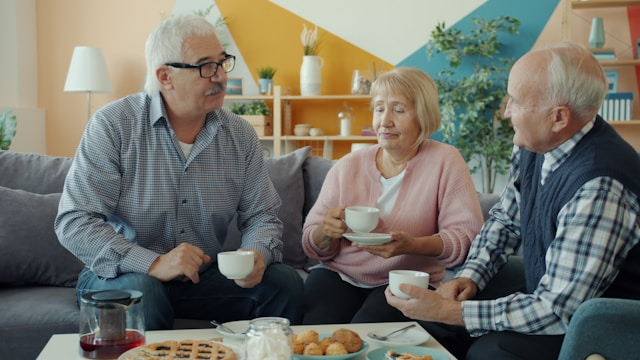Important Questions to Ask When Visiting a Care Home

Choosing the right care home for a loved one can be a challenging and emotional experience. It's essential to ensure that the facility not only provides the necessary medical care but also promotes a comfortable, respectful, and engaging environment for its residents. Whether you are looking for a nursing home, a residential care home, or a facility offering specialist services, asking the right questions is key to making an informed decision.
When you visit a care home, it is important to ask questions that cover a wide range of factors - care quality, staff, facilities, and lifestyle. Below are some of the most important questions to ask when visiting a care home, helping you feel confident that your loved one will receive the care and attention they deserve.
1. What is the Staff-to-Resident Ratio?
Understanding the staff-to-resident ratio is crucial. A good care home should have enough staff to ensure that residents receive timely attention and support. This ratio directly impacts the level of care your loved one will receive, as well as their overall well-being.
Inquire about the number of staff available per shift and how they manage various duties. Are there enough trained nurses available for medical emergencies? If your loved one has specific needs, such as personal care or end-of-life care, the staff should be able to provide that with the appropriate attention.
2. What is the Care Home's Approach to Personalised Care?
Every resident is unique, with different needs, preferences, and routines. It's important to understand how the care home provides personalised care. Do they create care plans tailored to each residents needs, including their mental health, physical health, and personal preferences?
Ask whether they focus on meaningful engagement by encouraging residents to participate in daily activities and recreational activities that cater to their interests. For example, do they offer opportunities for day trips or regular social activities to keep the residents engaged and mentally stimulated?
3. What Are the Visiting Hours?
Many families want to stay connected with their loved ones, so it's important to understand the visiting hours and whether they are flexible. Are set visiting hours enforced, or can family members visit outside of these times? Some care homes allow more flexibility to accommodate families' schedules, which can make a big difference in ensuring your loved one feels supported by their family and friends.
Also, consider how visitors are managed. Are there adequate communal areas where family and friends can spend quality time together with their loved one? This is an important aspect of ensuring your loved one's social life and emotional wellbeing are nurtured.
4. How Are Medical Emergencies Handled?
When it comes to medical emergencies, it's essential to know how well-prepared the care home is. Ask how they handle medical emergencies, including the availability of trained nurses and medical staff. Are there sufficient medical supplies and equipment on hand, or is external support needed for more serious situations?
You should also ask about the care home's approach to handling sensory impairments or residents with complex conditions who may need special support during medical emergencies.
5. Can My Loved One Bring Their Own Furniture and Personal Belongings?
A care home should feel as homely as possible for its residents. Some facilities allow residents to bring their own furniture, pictures, and personal items to make their space more comfortable and familiar. It's important to ask if the care home allows this, as it can help your loved one feel more at home.
Additionally, inquire about the process for settling in. Does the care home support residents personal preferences when arranging their rooms and belongings?
6. What Services Are Included in the Fee Structure?
Understanding the fee structure of the care home is vital. Ask for a detailed breakdown of what is included in the fees. Does the fee cover all the additional services, including meals, personal care, and recreational activities? Are special dietary needs and preferences catered for in the meals provided?
Some care homes may offer extra services that come at an additional cost, such as specialised treatments or day trips. It's helpful to know in advance what's included and what might incur extra charges, so there are no surprises later on.
7. What is the Care Home's Reputation for Quality?
One of the most effective way to evaluate a care home is by looking at its reputation. Ask about the care home's Care Quality Commission (CQC) rating or equivalent regulatory body, and request any recent inspection reports. This will give you a better idea of the facilities performance standards, including aspects like cleanliness, care staff training, and overall resident satisfaction.
A good care home will proudly share this information and be transparent about how they ensure high-quality care.
8. What Are the Care Home's Facilities Like?
Visit the facilities in person and assess whether they meet the needs of your loved one. Are the communal areas well-maintained and comfortable? Do they offer spaces for socialisation, relaxation, and recreation?
Take note of the accessibility of these areas. Is the care home equipped to accommodate residents with physical disabilities or sensory impairments? Ask if there are enough parking spaces for visitors, and whether there are any limitations on parking during peak times.
9. What Types of Activities Are Available for Residents?
A key element of a good care. home is providing residents with opportunities for recreational activities. Whether it's arts and crafts, exercise programs, or simple outings, it's important to ensure that the care home offers regular social activities that keep residents mentally and physically active.
You might also want to ask about specialised activities for residents with specific conditions, such as dementia or mobility challenges. Are the activities inclusive, and do they promote meaningful engagement with other residents?
10. What is the Care Home's Approach to End-of-Life Care?
Unfortunately, for some residents, the need for end-of-life care is inevitable. It's important to ask about how the care home manages this aspect of care. Do they provide personalised care during final stages of life? How do they support families during this emotional time?
It's also important to ask if the care home offers any spiritual or emotional support for residents and their families. This may include counselling services or support groups to help loved ones cope during this difficult time.
11. Is There a Waiting List?
Care homes can sometimes have long waiting lists, especially for certain types of care. It's worth asking whether there is currently a waiting list for the care home, and if so, how long the wait is likely to be. Understanding the timeline will help you plan accordingly, especially if you need care sooner rather than later.
12. What is the Care Home's Approach to Family Involvement?
Family involvement can play an essential role in the care of a loved one. Ask how the care home encourages family members to stay involved in the care process. Are they invited to care meetings and encouraged to contribute to care plans? How can family members provide feedback on their loved ones care?
Making an informed Decision for Your Loved One
Choosing the right care home for your loved one requires careful consideration and asking the right questions. By focusing on important aspects such as staff training, personalised care, facilities, medical support, and the quality of life provided, you can ensure that you make an informed decision.
Asking about the staff-to-resident ratio, special dietary needs, visiting hours, end-of-life care, and facilities will help you evaluate whether the care home aligns with your loved ones need and preferences.
Visiting different care homes, speaking to the care home manager, and reviewing feedback from other families will also help you feel confident that you've found the right care home. With the right questions, you can ensure that your loved one will receive the compassionate care and respect they deserve, in a place that supports both their physical and emotional well-being.






